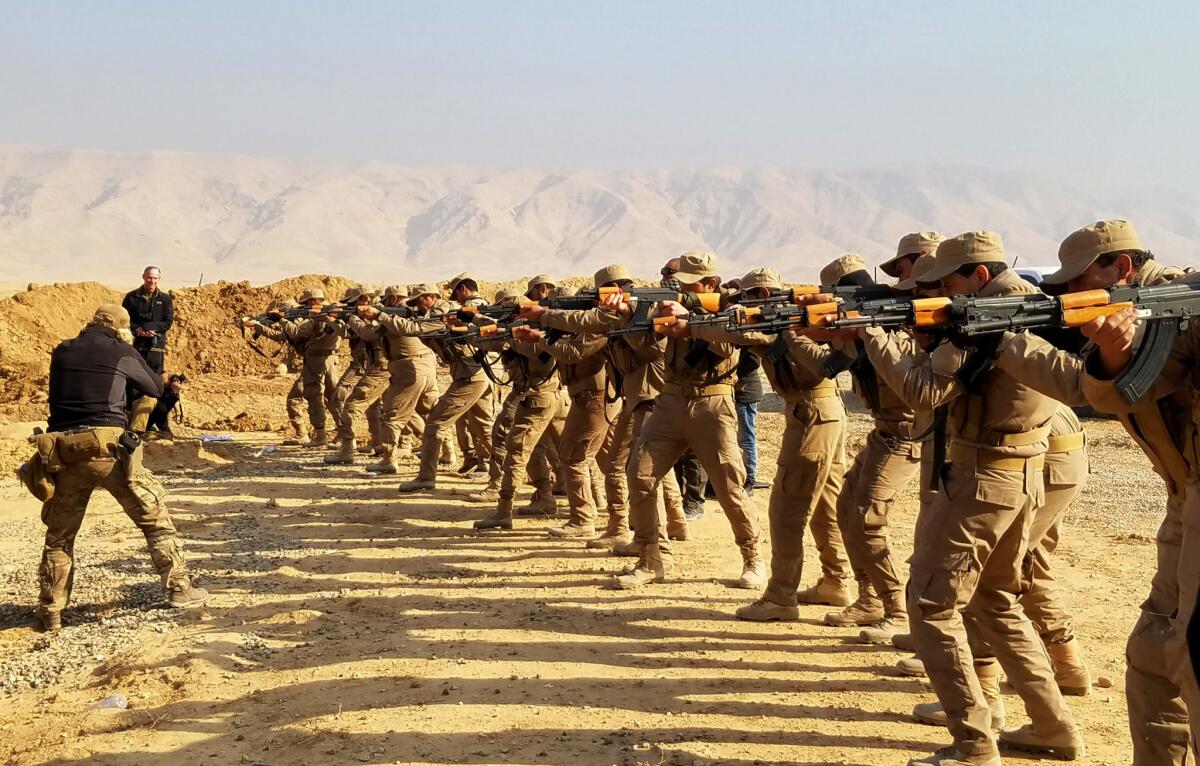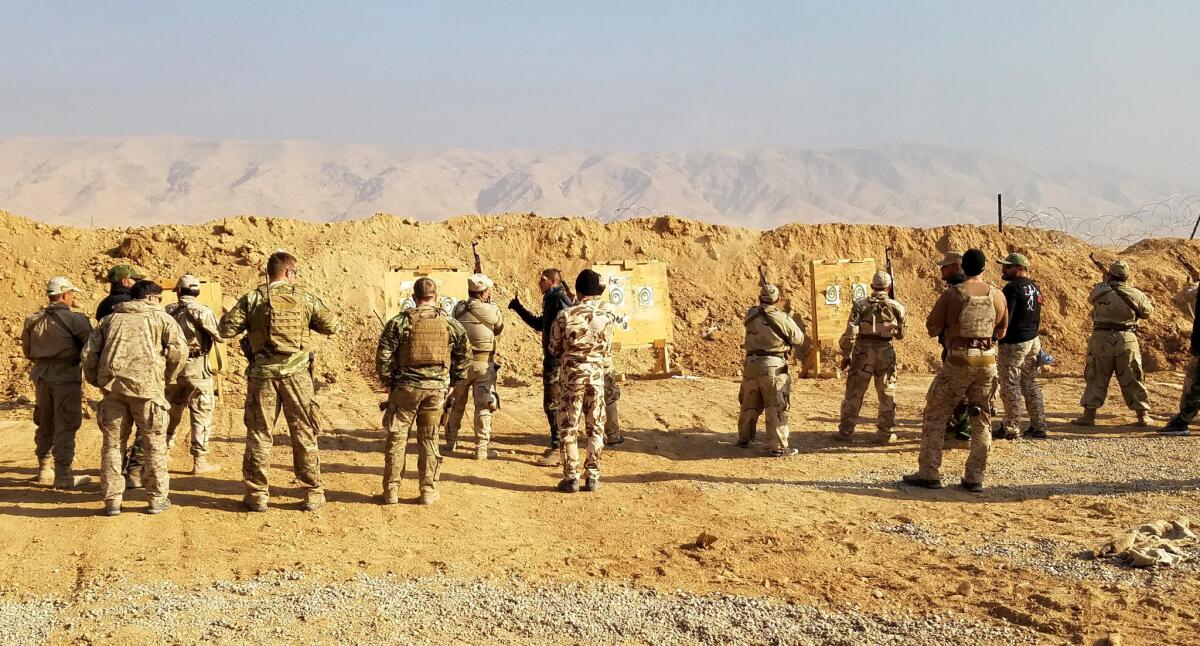The U.S. is helping train Iraqi militias historically tied to Iran

This month, U.S. and coalition forces in Iraq started training Shiite militia fighters to assist the Mosul offensive. (Molly Hennessy-Fiske)
- Share via
Reporting from Kalah Sur, Iraq — In a significant break with past policy, U.S.-led forces in Iraq have started arming and training hundreds of fighters belonging to Shiite militias historically known for having ties to Iran.
The sectarian militias are being trained for the operation to retake the Iraqi city of Mosul. While Mosul’s future remains uncertain, the cooperative effort is expected to strengthen the Shiite forces both militarily and politically.
The U.S.-led coalition has provided hundreds of guns and training to the fighters in recent weeks, indicating a new level of cooperation, although U.S. military officials quickly moved to downplay it, saying the fighters being trained have no ties to the Iranian-backed groups that targeted Americans in the past.
In response to The Times’ reporting, Col. John Dorrian, the U.S. military spokesman in Baghdad, insisted that “U.S. policy on this matter has not changed.”
“We only train forces we can vet,” Dorrian said. “You assess to make sure they don’t have association with terrorist groups, or groups associated with the government of Iran. They must be with groups that promote respect for human rights and rule of law.”

Dorrian acknowledged that some militias are still classified as terrorists by the U.S., but insisted those being trained had no ties to groups that have “American blood on their hands.”
But U.S. officials acknowledged the difficulty in fully vetting all members of the militias. And the senior leadership of the Shiite forces includes individuals who have been deemed terrorists by the United States.
After successfully fighting Islamic State elsewhere in Iraq, the militias received the government’s blessing to take part in offensives, including the one to reclaim Mosul, which was launched Oct. 17.
Experts estimated there are at least 40 of the militias with a combined 80,000 to 100,000 active members.
Mosul is Iraq’s second-largest city, with a diverse populace of more than a million people, and has been the biggest prize captured by Islamic State in its drive to create a “caliphate” in Iraq and Syria.
Its population is mostly Sunni Muslim, the sect that Islamic State claims to represent, and some human rights groups feared that allowing Shiite fighters to join the offensive would spark sectarian conflict.
But the Shiite militias — which have brought some Sunnis and other sects into their ranks — have promised to follow orders from Iraqi Prime Minister Haider Abadi. Last month, the Iraqi parliament passed a law that made the militias a legal military corps. Their leaders resent being called militias, noting they have government backing.
Coalition forces are screening Shiite militia commanders using U.S. and allies’ law enforcement and intelligence databases to weed out those with ties to terrorist groups or to Shiite militias backed by Iran, according to U.S. officials who were not authorized to speak publicly about the training.
“We’re going to go through and vet all the leaders,” one official said.
But the U.S. will not be able to screen all of the militias’ foot soldiers, the officials said. And others noted that there still are leaders associated with the militias who fall outside U.S. guidelines for acceptable allies.
Among the most powerful is Hadi Ameri, the head of the Badr Organization, the military wing of a Shiite political party. Ameri recently defended his long-standing ties to Iran while visiting militia fighters on the front lines. His group’s role in the offensive is expected to help his party in next year’s elections.
“It’s a mistake,” said Michael Pregent, a former Army paratrooper who served in Iraq and is now an Iraq expert at the Washington-based Hudson Institute. The Shiite militias, he said, were “directly involved in killing Americans. They’re sectarian.”
Haitham Mayahi, senior political advisor to Ameri, said the militia leaders agreed to have up to 900 new fighters trained to help expand their ranks and hold cities once they are cleared of Islamic State militants.
The Shiite militias have been accused by the U.S.-led military coalition of committing sectarian-driven crimes against Sunni populations in the areas under their control.
The U.S. refused to provide air support to the militias during an offensive last year in Tikrit, after photos appeared online of Maj. Gen. Qassem Soleimani, commander of Iran’s elite Quds special forces and an ally of the militias’ leaders, drinking tea outside the city. His role in the battle unsettled U.S. officials, who declared Soleimani (nicknamed “the Shadow Commander”) a terrorist and accused him of directing deadly attacks on U.S. forces in Iraq a decade ago.
The militias tried to recapture Tikrit from Islamic State, but were ordered to withdraw when their monthlong offensive stalled. Only after the Iraqi army took over did U.S. warplanes support the operation, which eventually ousted the militants.
The Popular Mobilization Forces, known in Arabic as Hashd al Shaabi, were later accused of destroying hundreds of homes and businesses during the offensive, according to a report by Human Rights Watch.
In October, Amnesty International documented allegations the militias had abused and killed Sunnis during the spring offensive to recapture the city of Fallujah.
Last month, during the Mosul offensive, Human Rights Watch reported that some Popular Mobilization Forces detained and beat shepherds from a village near Mosul whom they suspected of being Islamic State militants.
After the Iraqi parliament passed the law legalizing the militias, U.S. and coalition special forces began training 500 of the new recruits, many of them Sunni, at multiple sites outside Mosul on Dec. 4, Dorrian said.
He said the recruits come from areas outside Mosul held by Islamic State. Once towns surrounding Mosul are recaptured, the new fighters will help secure them. They were provided with Kalashnikov rifles, 10 days of training and the promise of monthly salaries of $500 to $600, commanders said.
Brett McGurk, the State Department’s special envoy in the fight against Islamic State, said many of the Shiite militias operate outside the command and control of the Iraqi government, “which is a significant problem.”
But under their umbrella, he said, are local forces invaluable for holding ground in areas familiar to them. “We cannot do that only with the Iraqi security forces,” he said. “We needed the tribes to be mobilized.”
Pentagon officials stressed that the militia’s commanders will be screened and recruits must abide by the federal Leahy Law, named for Vermont Sen. Patrick J. Leahy, which bars the Pentagon from providing military assistance to foreign fighters who violate human rights.
U.S. and coalition trainers stood beside militia recruits on a firing range at a former Iraqi army facility south of Mosul on Sunday, offering tips on how to reload their rifles. The trainers said they have also been teaching the citizen soldiers how to stop battlefield bleeding and how to avoid and defuse bombs.

A U.S. special forces trainer in unmarked camouflage fatigues, who asked not to be identified because of security concerns, said he felt he was helping to save the lives of the fighters, many of them untrained civilians: taxi drivers, carpenters and waiters.
He said some had never handled a gun, but that they were enthusiastic students, more so than local forces he had trained in Afghanistan and Yemen.
Many of the recruits were Sunnis Arabs, but there were also Christians, Kurds, Turkmen, Yazidis and Shiites, commanders said. While many were untrained, some were former police and soldiers, including a few who had fought U.S. forces as part of former Iraqi leader Saddam Hussein’s army.
“We were enemies. Now we are friends,” said Usmat Mohamed, 47, a former soldier from a Sunni tribe.
Gahzi Abar, a commander with the militia who is a Sunni Turkmen, said “the reason that we became Hashd al Shaabi is that it is now an organized and legalized force.”
“Our affiliation is to our country and not to any neighboring countries,” he said.
Some experts said it was wise for the U.S. to make inroads with Shiite militias now, before Mosul is recaptured and a sectarian struggle for control begins in earnest.
“The more they get involved with them, the better understanding and avoidance of misconception and misapprehension between the two,” said Mowaffak Rubaie, Iraq’s former national security advisor, now a member of parliament who supported legalizing the militias.
“One thing that’s been realized by U.S. officials is that in Iraq, if you pull out, you leave a lot for Iran to influence,” said Renad Mansour, a fellow specializing in Iraq at the London-based think tank Chatham House.
Others warned that the training could backfire on the U.S.
House Foreign Affairs Chairman Ed Royce (R-Fullerton) urged Abadi this year to rein in the militias. Royce said this week that it was still risky for the U.S. to become involved with the groups.
“Shia paramilitary forces — many of them funded, armed and even directed by Iran’s Islamic Revolutionary Guards Corps — have been responsible for horrific human rights abuses,” he said. “The Obama administration is playing with fire.”
Hennessy-Fiske reported from Kalah Sur and Hennigan from Washington.
ALSO
Islamic State may be losing ground, but its recapture of Palmyra in Syria shows it is still a threat
Pentagon says human errors led to mistaken bombing of Syrian-backed forces
Islamic State is killing civilians, but these Mosul residents still won’t flee
UPDATES:
Dec. 14, 10:25 a.m.: This article has been updated with further response from the U.S. military.
This article was originally published at 4:45 p.m. Dec. 13.
More to Read
Sign up for Essential California
The most important California stories and recommendations in your inbox every morning.
You may occasionally receive promotional content from the Los Angeles Times.












